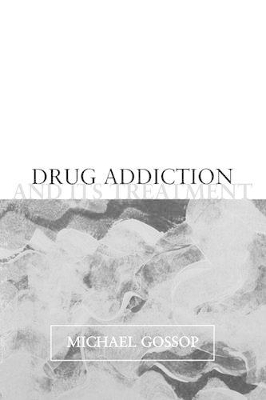
Drug Addiction and its Treatment
Seiten
2003
Oxford University Press (Verlag)
978-0-19-852608-7 (ISBN)
Oxford University Press (Verlag)
978-0-19-852608-7 (ISBN)
Examines the role of treatment in helping drug users to recover from the range of problems affecting them. This book contends that interventions should be responsive to the specific needs of individual drug misusers, and considers the contribution made by pharmacological management strategies, psychological therapies and supportive groups.
Few problems are as complicated as drug misuse. Drug addiction is a major public health issue with implications for healthcare systems and society at large. As well as expenditure on prevention, treatment and rehabilitation, costs are also incurred by the welfare, social service and the criminal justice systems. In addition, there are further human costs associated with impaired health, damaged relationships and lowered productivity.
This book is about treatment options. The history of addiction treatment has been characterised by fads and fashions. Some of the treatments used have been, at best ineffective, at worst harmful, and occasionally even dangerous. However, in the past two decades, many promising treatment interventions and procedures, and new therapeutic agents have been developed. Different forms of psychological treatments have been tested and provided in a systematic manner. There are a range of pharmacological options where once there were very few. Most importantly, there is increasing evidence about the effectiveness of many of these treatments, and there is a clearer understanding of the importance of the social, environmental, behavioural and cognitive processes involved, as well as the use of active coping strategies during recovery.
Addiction treatment involves a variety of different practices and procedures used with different populations and which are designed to achieve different goals. Drug Addiction and its Treatment explains why no single treatment is effective for everyone with a drug addiction problem.
Treatment is provided by a range of personnel from differing backgrounds and in a range of settings. This book should be read by psychiatrists, clinical psychologists, social workers, nurses, policy makers, service managers, and researchers with an interest in addiction.
Few problems are as complicated as drug misuse. Drug addiction is a major public health issue with implications for healthcare systems and society at large. As well as expenditure on prevention, treatment and rehabilitation, costs are also incurred by the welfare, social service and the criminal justice systems. In addition, there are further human costs associated with impaired health, damaged relationships and lowered productivity.
This book is about treatment options. The history of addiction treatment has been characterised by fads and fashions. Some of the treatments used have been, at best ineffective, at worst harmful, and occasionally even dangerous. However, in the past two decades, many promising treatment interventions and procedures, and new therapeutic agents have been developed. Different forms of psychological treatments have been tested and provided in a systematic manner. There are a range of pharmacological options where once there were very few. Most importantly, there is increasing evidence about the effectiveness of many of these treatments, and there is a clearer understanding of the importance of the social, environmental, behavioural and cognitive processes involved, as well as the use of active coping strategies during recovery.
Addiction treatment involves a variety of different practices and procedures used with different populations and which are designed to achieve different goals. Drug Addiction and its Treatment explains why no single treatment is effective for everyone with a drug addiction problem.
Treatment is provided by a range of personnel from differing backgrounds and in a range of settings. This book should be read by psychiatrists, clinical psychologists, social workers, nurses, policy makers, service managers, and researchers with an interest in addiction.
1. A background to addiction and its treatment ; 2. Drug use and multiple drug use ; 3. Consumption behaviours, problems and dependence ; 4. Psychological health, physical health and mortality ; 5. The relationship between the drug user and treatment ; 6. Assessment and setting treatment goals ; 7. Withdrawal and detoxification ; 8. Psychological treatments ; 9. Narcotics Anonymous, twelve-step programmes and rehabilitation treatments ; 10. Methadone treatments ; 11. Other drug treatments ; 12. Duration, intensity and setting ; 13. Causes for concern: issues for attention ; 14. Treatment effectiveness and social policy
| Erscheint lt. Verlag | 1.12.2003 |
|---|---|
| Zusatzinfo | 7 line drawings |
| Verlagsort | Oxford |
| Sprache | englisch |
| Maße | 156 x 233 mm |
| Gewicht | 513 g |
| Themenwelt | Geisteswissenschaften ► Psychologie ► Klinische Psychologie |
| Geisteswissenschaften ► Psychologie ► Persönlichkeitsstörungen | |
| Medizin / Pharmazie ► Medizinische Fachgebiete ► Psychiatrie / Psychotherapie | |
| Medizin / Pharmazie ► Medizinische Fachgebiete ► Suchtkrankheiten | |
| Studium ► Querschnittsbereiche ► Prävention / Gesundheitsförderung | |
| ISBN-10 | 0-19-852608-3 / 0198526083 |
| ISBN-13 | 978-0-19-852608-7 / 9780198526087 |
| Zustand | Neuware |
| Haben Sie eine Frage zum Produkt? |
Mehr entdecken
aus dem Bereich
aus dem Bereich
Orthomolekulare Medizin in Prävention, Diagnostik und Therapie
Buch | Hardcover (2022)
Thieme (Verlag)
CHF 81,80
Lehrbuch zur berufsspezifischen Ausbildung
Buch | Softcover (2021)
Kohlhammer (Verlag)
CHF 64,40


